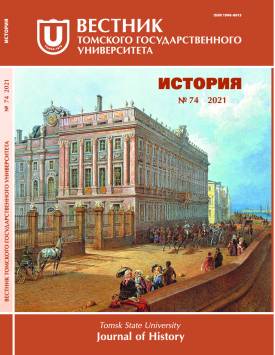The journey of the intellectual: an ethnologist's view
The purpose of the article is to analyze the specifics of travel of an intellectual from the standpoint of ethnology. The empirical base of the study was the in-depth interview of four travelers. The selection of respondents was carried out using the snowball method. The journey of the intellectual is chosen as the subject of our research by chance. The journey of the intellectual is a border between mass educational tourism and a targeted research expedition. The following are accepted as intellectual’s criterions for this article: 1) the presence of higher education; 2) the profession of knowledge work (teacher, doctor, lawyer, psychologist, writer); 3) the stability of the educational nature of travel. The authors believe that the journey of an intellectual can be described as a multi-layered, multi-level, which combines past and future travel, professional interests and children’s dreams, statics and mobility, broad horizons and individual preferences. The complex nature of the journey of the intellectual reveals itself at the level of the motive. It also undergoes a change in time and demonstrates a certain mobility: interest is replaced by the desire to get out of the usual environment, shake yourself. Sometimes the intellectual traveler does not set himself the task of escaping from the captivity of bored reality, it is also involved in the journey, albeit unconsciously, for example by the presence of colleagues during the journey. Summing up the ethnological research conducted, we formulate several conclusions. First, the journey of an intellectual, if it is free from any scientific or social burden, is distinguished by the dialectic of feeling and knowledge, creating a bizarre mixture of educational tourism and deep scientific, and sometimes philosophical generalizations. Secondly, the journey of an intellectual appears to him as one of the forms of self-identification, finding himself. Thirdly, the experiences and actions of intellectuals before and after the journey often resemble transitional and borderline states, similar to initiation, shamanic disease and magic. The traveling intellectual and the shaman have in common the synthetic character of their abilities and roles. For example, respondents appear in the process of travel, the temporal and spatial boundaries of which are conditional, as guides, storytellers, cooks, collectors and photographers. Finally, the intellectual is characterized by a contradictory attitude towards the “alien” space of travel. On the one hand, he makes a demand in risk, unpredictability, surprise, on the other - trying to streamline the journey itself as much as possible, to make it close to the reality that surrounds it in everyday life.
Keywords
travel anthropology, intellectuals, chronotope, transitional statesAuthors
| Name | Organization | |
| Idiatullov Azat K. | Ulyanovsk State Pedagogical University named after I.N. Ulyanov | azkoidiat@yandex.ru |
| Burakov Sergey O. | Ulyanovsk State Pedagogical University named after I.N. Ulyanov | bosq@rambler.ru |
References

The journey of the intellectual: an ethnologist's view | Tomsk State University Journal of History. 2021. № 74. DOI: 10.17223/19988613/74/20
